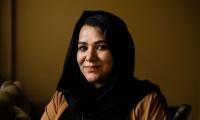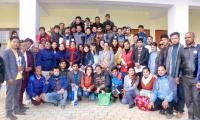"The women of Afghanistan have not given up"
August 15, 2023, marks the two-year date for the hastily withdrawal of international troops and diplomats from Afghanistan. The Taliban takeover has erased 20 years of equality rights development in just two years, as women and girls are increasingly being excluded from civic life. Nargis Nehan, former Minister in Afghanistan, provides her perspectives on the last two years and hopes for her country’s future.

Can you briefly describe your early life and the circumstances that led you to flee Afghanistan at a young age?
Afghanistan was already invaded by the Soviet Union when I was born. I was born in conflict, raised in conflict, and still witness conflict in my homeland. I was just twelve years old when the US-backed mujahideen, who fought and ended the Soviet occupation, took power. Unfortunately, they could not agree on the formation of a government and began turning on each other, killing thousands of people, destroying Kabul city, and forcing millions of people to migrate to Pakistan and Iran.
The civil war was the main reason that my family had to leave Afghanistan. I still remember when we first went to the north of Kabul and took refuge in a public school for some weeks. When all our food and savings ran out and we had nothing to eat, we came back to Kabul, but the situation has worsened. Several girls in our neighbourhood were kidnapped, and some were forced into marriage. Having several young daughters, my parents got anxious to leave within a day before the neighbourhood would know we were back. They took some important stuff and some food stock, and we left with three other families in a truck for Pakistan. My parents also took my nine female cousins to Pakistan, as my aunt and two uncles could not leave due to financial constraints, but they sent their daughters with us.
In 2017, you were appointed minister. How was the political life and democratic environment in Afghanistan at this time?
Unfortunately, the western media has always covered and portrayed the negative stories from Afghanistan, making taxpayers wonder why their governments were assisting Afghanistan. I am not saying everything was perfect before August 15 in Afghanistan, but it was also not an absolute failure. Despite all the challenges, including corruption, impunity, deadly suicide attacks, and poor governance, that Afghanistan was crumbling with, having a democratic and open society enabled the women and young generation to take part in the development of their country, hold the decision-makers accountable, and engage in all affairs of their country.

As someone who worked and lived in Afghanistan from 2002 to 2021, I witnessed the incredible transformation that my country went through. Democracy, inclusivity, and diversity were in the process of becoming normalised in Afghanistan. Women’s political participation and leadership were reintegrating into our culture, and even traditional men and religious leaders were participating in programmes arranged by women and speaking about women’s rights and social cohesion. I served as the first female Treasurer of Afghanistan, the first female member of the Supreme Council of the Central Bank of Afghanistan, and the first female Minister of Mines and Petroleum. Yes, the men were creating barriers for me left and right. However, they never openly challenged my appointment to these positions. Right before August 2021, we had women serving in senior positions in the Ministries of Defence and Interior. These examples may look minor and normal to countries such as Denmark, where women enjoy their full rights, but not to countries like Afghanistan, where women are treated as secondary human beings possessed by men.
The Taliban regained control over Kabul in August 2021, prompting your evacuation. How did this transition impact you personally and professionally?
While giving you the answer, I still feel emotional and traumatised. I was in office on August 15 when my brother called me and told me that the Taliban had entered Kabul. On my way home, I saw a different Kabul where people were frightened, the shops were already closed in the middle of the day, and everyone was in a hurry to get home.
As someone who was highly vocal and actively engaged in all the affairs of my country while serving my community, I lost my identity and agency in the blink of an eye. Suddenly, from a saviour of women and my community, I became such a burden that even my relatives were scared to host me. I was hiding from one place to another until I was evacuated to Norway.
I am very grateful to Norway and all other countries that evacuated Afghan people, especially women, but as soon as we entered these countries, we were not their partners and allies anymore; we were just another number in their system. I was placed in a small village up in the north of Norway, from where I had to take two planes to get to Oslo. I was placed in such a faraway and isolated village that I was wondering whether I had made the right decision by leaving Afghanistan. Thanks to technology, connectivity, and mediums such as Zoom, WhatsApp, Twitter, and others for enabling us to stay in contact with each other, communicate with our families, relatives, and women inside Afghanistan, initiate different interventions for building the resilience of those who were stuck there, and continue our advocacy with the international community. If these mediums were not available, we would all have disappeared in corners of different countries, and there would be no news or stories about the plight and sufferings of Afghan women. Despite all these struggles, I find it disheartening when the international community is dividing us between women inside Afghanistan and outside and trying to delegitimize our voice just because it doesn’t suit their newly adopted strategy for Afghanistan, which is purely focused on geo- and regional politics rather than democracy, human rights, and equality.
How have you seen the rights and opportunities for women and girls change since the Taliban took over?
Today, we have lost most of those achievements in Afghanistan that all of us were speaking proudly about. In today’s Afghanistan, girls are not allowed to go to school beyond grade six; they are banned from higher education and from working in public institutions, NGOs, and UN agencies. They cannot travel without a male guardian. Even when women fall sick, they should wait for a man to take them to the doctor, as they are not allowed to visit doctors and hospitals without a male guardian. They are not allowed to go to parks and amusement places. The last directive issued by the Taliban a few weeks ago closed all the beauty salons run by women for women, making around 7,000 more women jobless and closing the only place where women were getting together for leisure and relaxation. We must remember that Afghanistan has been in conflict for more than four decades, with many thousands of households with female breadwinners. Those women who once made up 20% of the workforce are now turned to beggars asking for a loaf of bread on the streets for themselves and their children.
There is not much opposition to Taliban’s rule in Afghanistan at the moment. How has the return of the Taliban rule affected democratic progress in the country?
First, I have to humbly disagree when you say there is not much opposition to the Taliban’s rule in Afghanistan. When it comes to opposition and resistance against the tyranny of the Taliban, who know nothing but violence, we need to understand the context and judge the situation pragmatically. Resisting and opposing the Taliban regime means detention, torture, and death. As soon as the Taliban came to power and most of the former security forces joined the National Resistance Front in fighting them, the people went out in mass asking for their rights, and the young girls took to the streets asking for their rights to education, work, and freedom. The Taliban responded in the most brutal manner. They tortured and punished the residents of those provinces where there is resistance against them; they do not even allow humanitarian assistance for these residents. Today, many young girls who went to the streets and protested for their rights, journalists, and civil activists who criticise the Taliban regime are in prison, and the former security forces are found dead every day.
Despite all these deadly challenges, Afghan society is still highly vibrant and resilient. The young girls are still protesting for their rights using different strategies, and TV and radio channels, despite all restrictions, are hosting programmes in which participants are openly expressing their views about the current situation. People are even organising poetry evenings where they criticise the de facto regime in their poems. Those who are evacuated from Afghanistan have formed several platforms for continuing their activism. Unlike in the 1990s, when Afghanistan was erased from the world’s agenda with no voice, this time around Afghan people are using social media smartly and effectively to disseminate information and communicate their message to the world. They are using digital platforms to interact among themselves and the international community, advocating for and watchdogging the international community’s engagement and negotiations with the Taliban. In today’s Afghanistan, people have learned to express their opinions and make themselves heard. Today, no one can impose their political agenda on Afghans against their will.
Today, we do not have a democratic country, but our society is still vibrant, open, and democratic.
What are your hopes and aspirations for the future, both for yourself and for the women and girls of Afghanistan?
Afghanistan’s current situation is the darkest chapter in the history of humanity. In the 21st century, the world is trying to convince us to accept the Taliban as a reality and work things out with them. The world has given up on human rights, justice, and democracy, but the women of Afghanistan have not. We will continue our struggle for an open, equal, and diverse Afghanistan. The world is not giving us stages and platforms to raise our voice; we will use social media and other mediums to create our own platforms to raise our voice and hold those who are engaged in the affairs of Afghanistan to account. We will come up with different interventions to build the resilience of women and young girls in Afghanistan, help them continue their education, and build their capacity through different online programs.
We are on the right side of history, and eventually the world will have no choice but to join us. This time, the liberation of Afghanistan will be led and marked by the women of Afghanistan.
How do you envision the international community continuing to support Afghan civilians without compromising their rights and well-being?
First and foremost, the international community must address the ongoing humanitarian crisis. Afghan people, who are being pushed into poverty in a collapsing economy, need a commitment to emergency support in lieu of empty promises and statements. They can use UN agencies and NGOs to provide basic services to people.
Second, the international community must, in consultation with Afghan women, come up with flexible and adoptable interventions to support the building of the resilience of women and youth to serve their communities, build social cohesion, and stand up for women and vulnerable groups.
Third, the world must recognise Afghan women and youth as their long-term partners, engage with Afghan women and civil society more seriously, and support us with platforms to self-organise, convene dialogues with other actors, and develop a women and youth-centric political pathway for sustainable peace in Afghanistan.



